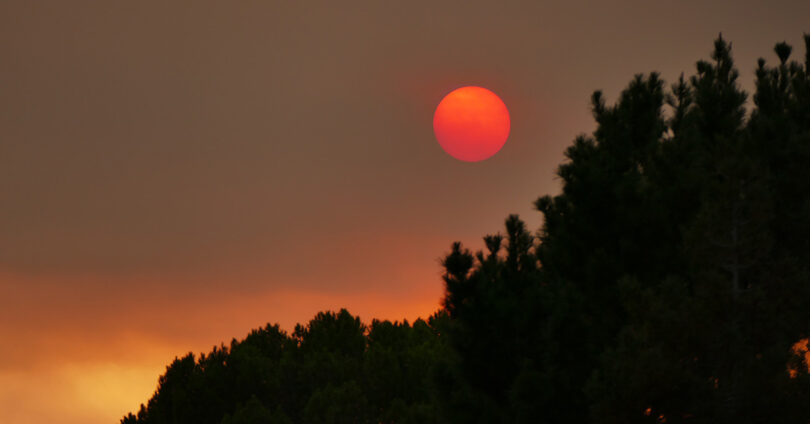Hundreds of wildfires are burning across Canada, triggering evacuation orders and covering many cities with smoky or smoggy skies and a smell of burning.
Environment Canada has issued air quality warnings for several parts of the country, including Ontario and Quebec, due to pollution caused by forest fires.
Many people are wondering what poor air quality means for their lungs and how they can stay safe and healthy during these conditions.
We asked Linda Rawe, a Respiratory Therapist and the Manager for Respiratory Therapy at Sunnybrook, to offer some insight.
How can poor air quality from wildfire smoke affect people’s health, including their lungs and breathing?
Initially some people might notice more superficial symptoms like itchy or dry eyes that they feel the need to constantly rub. Eyedrops can help alleviate that. They might also have a sore, irritated or dry throat with or without coughing and feel like they need a drink of water. Or they might be sneezing. In all these cases, it can feel like there are irritants.
But then some people might also have difficulty breathing, as though it’s hard to inhale deeply enough. Or they might get short of breath very quickly.
If people experience symptoms, when should they seek medical attention?
If people’s symptoms clear up once they go into their home or a building where they have less exposure to the poor air and they resolve very quickly, then I would say they are probably fine.
But if their shortness of breath doesn’t resolve when they are indoors, especially if they have a pre-existing condition, then they should seek medical attention either from their family doctor, a walk-in clinic or another urgent or emergency care provider.
Who is most at risk?
The very young and the elderly are at higher risk. With the very young, their lungs are still growing. And for the elderly, lung function, volume and respiratory reserves decline as you get older.
Those with pre-existing lung conditions like asthma, fibrosis (damaged lung tissue) or COPD (chronic obstructive pulmonary disease) would have the most issues with poor air quality – especially on exertion.
Pregnant people might also feel the effects more than others, especially later in pregnancy, because they can experience shallow breathing as the fetus presses up against the lungs and affects lung volume.
When people experience symptoms, how quickly can their lungs clear once the air gets better?
It depends on the person and whether they are healthy or have pre-existing lung conditions.
It also depends on how long they are outdoors during the poor air quality. If they are outdoors for hours or work outdoors, then it’s going to build up. But again, it varies for each person. For example, smokers may experience more impact because they have damaged the cilia (tiny hairs) in their lungs, affecting their ability to clear the particulates out of their lungs.
Are there steps people can take to protect themselves during periods of poor air quality?
The most important thing is to minimize your time outdoors. If you can, stay indoors – especially if there is air conditioning or an air filtering device.
As well, avoid exertion outdoors and remember that wearing a simple barrier like a medical mask can help.
Any other advice to offer?
Just be careful, and know that no one is immune to this. People think, ‘Oh, I’m young, I’ll be fine.’ And they go out and try to do their daily jog but it will affect them and they need to be careful.
And I’m a huge camper myself, but let’s make sure we don’t create any more forest fires when we’re outdoors. It’s very dry out there. Let’s heed the fire bans that are in effect.








